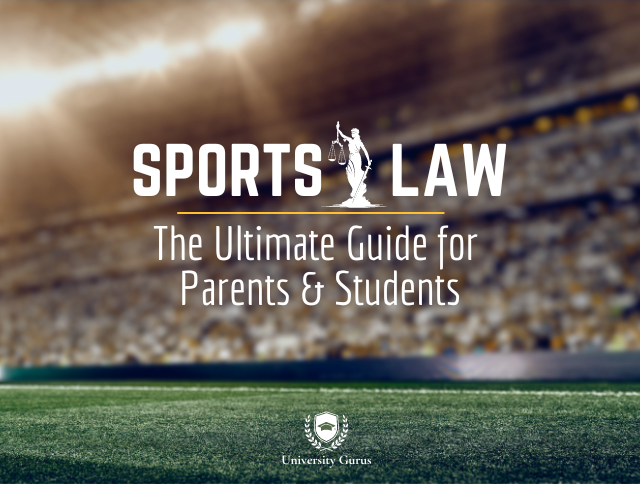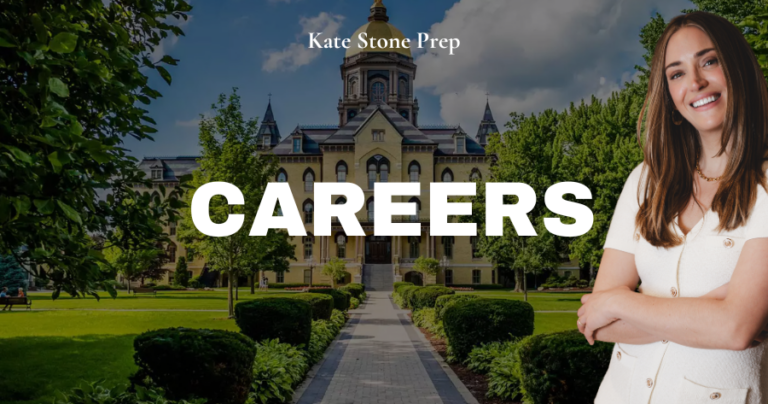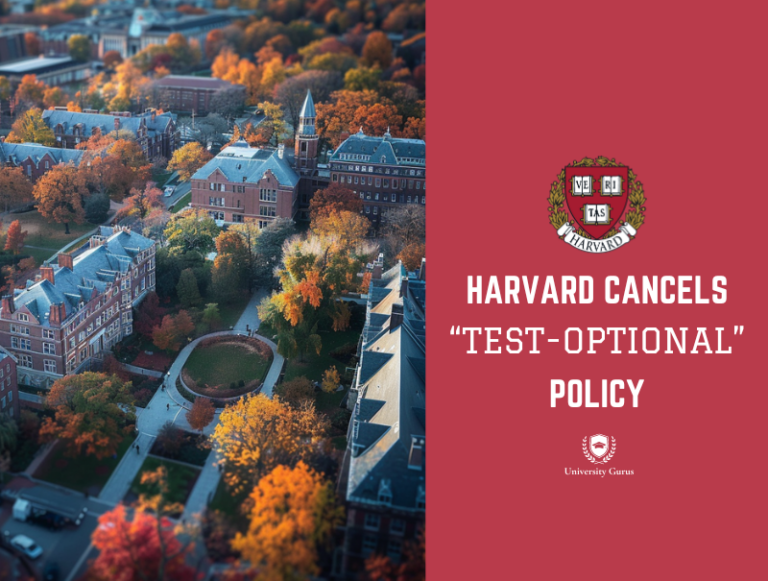(203) 714-4435

Introduction
The intersection of sports and law presents a thrilling career path filled with dynamic challenges and opportunities. Sports Law, a niche yet expanding field, encompasses everything from contract negotiations to dispute resolutions, directly impacting the sports industry’s fabric. This guide aims to illuminate the pathway for ambitious students dreaming of a career in this vibrant sector, outlining strategic steps from undergraduate education to securing that first coveted job in Sports Law.
Understanding Sports Law
At its core, Sports Law deals with legal issues and disputes within the sports industry. It’s a broad field that splits into two main areas: Dispute Sports Law, focusing on resolving conflicts, and Contract Sports Law, centered around drafting and negotiating agreements. An early understanding of these domains can help tailor your academic and professional pursuits towards your interests.
Here’s a list of important terms and concepts that anyone interested in this area should become familiar with:
- Agent Certification – The process by which sports agents are officially recognized and permitted to represent athletes in negotiations with teams and brands.
- Arbitration – A method of dispute resolution used in sports to resolve conflicts between players, agents, and teams or leagues, often as an alternative to court litigation.
- Collective Bargaining Agreement (CBA) – A contract between a sports league and its players’ association outlining labor terms, including wages, working conditions, and other employment terms.
- Contract Law – Governs the creation, enforcement, and dissolution of contracts between parties, including athlete contracts, endorsement deals, and broadcasting rights agreements.
- Doping and Anti-Doping Regulations – Rules and regulations governing the use of performance-enhancing drugs in sports, including testing procedures and penalties for violations.
- Endorsement Deals – Agreements between athletes and companies where the athlete promotes the company’s products or brand in exchange for compensation.
- Intellectual Property Rights – Legal protections for creations of the mind, such as logos, team names, and merchandise designs, crucial in sports for branding and revenue.
- Licensing Agreements – Contracts that allow one party to use another’s intellectual property for specified purposes, common in merchandising and broadcast rights.
- Salary Cap – A limit on the amount a team can spend on player salaries, designed to maintain competitive balance within a league.
- Sports Governance – The rules, regulations, and standards set by governing bodies that oversee sports organizations and events.
- Title IX – A federal civil rights law in the United States that prohibits sex-based discrimination in any school or education program that receives federal funding, significant for its impact on sports equality.
- Tort Law – Covers civil wrongs and injuries in sports, including negligence and liability issues, such as player injuries or fan safety.
- Transfer Rights and Fees – In international sports, particularly soccer, the rights and fees associated with transferring a player from one club to another.
- Wagering and Sports Betting Laws – Regulations governing betting on sports events, which vary significantly by jurisdiction and have been evolving rapidly with the legalization of sports betting in many regions.
Choosing the Right Undergraduate Major
Selecting an undergraduate major is your first step on the road to Sports Law. While there’s no one-size-fits-all answer, degrees in Sports Management, Public Relations, and Sports Analytics offer foundational knowledge applicable to the sports law field. Sports Management is highly recommended for those seeking a broad perspective on the sports industry, encompassing essential business and legal aspects.
Selecting the Right Undergraduate School
Choosing a school involves more than just academics. Consider institutions with robust sports programs and opportunities for practical involvement. Schools such as Clemson University and University of Michigan offer excellent programs in recommended majors and foster environments where you can immerse yourself in sports culture.
The following colleges offer strong programs in areas relevant to sports law, such as Sports Management, Public Relations, and Sports Analytics. They also provide valuable extracurricular opportunities for gaining industry insight and experience:
- University of Michigan – Offers comprehensive programs in Sports Management and opportunities for engagement in athletics and sports-related activities.
- Clemson University – Known for its robust Sports Management program and active sports culture, providing practical experience.
- Ohio State University – Offers diverse opportunities in sports analytics and management with strong ties to athletics.
- New York University – The School of Professional Studies at NYU provides unique programs tailored to sports business, coupled with proximity to major sports agencies in NYC.
- University of Florida – Offers strong programs in Sports Management and opportunities for involvement in a vibrant sports culture.
- Syracuse University – Renowned for its Sports Management program and strong connections to the sports industry.
- University of Southern California – Offers excellent opportunities in Sports Management and Public Relations, with a strong alumni network in the sports industry.
- University of Texas, Austin – Known for its Sports Management and Business programs, offering students exposure to a rich sports culture.
Gaining Practical Experience and Developing Skills
Real-world experience is invaluable. Engage in internships with sports teams, law firms, or agencies. Participate in sports-related activities, be it as a team manager or contributing to a student newspaper’s sports section. These experiences not only enrich your resume but also hone crucial skills like writing, critical thinking, and industry-specific knowledge.
Real-world experience is invaluable. Engage in internships with sports teams, law firms, or agencies. Participate in sports-related activities, be it as a team manager or contributing to a student newspaper’s sports section. These experiences not only enrich your resume but also hone crucial skills like writing, critical thinking, and industry-specific knowledge.
Beyond academics, dive into extracurriculars that align with your career goals. Seek mentorship from industry professionals, join sports law associations, and attend relevant seminars. These activities are not just resume builders; they’re opportunities for networking and gaining insights into the sports law landscape.
Engaging in these activities can provide invaluable experience and networking opportunities:
- Internships with Sports Teams – Working in various capacities for professional or college sports teams.
- Law Firms Specializing in Sports Law – Gaining firsthand experience in the legal challenges and considerations within the sports industry.
- Sports Management Internships – Offers exposure to the business side of sports, complementing legal education.
- Student-run Sports Publications – Developing writing and analytical skills while focusing on sports topics.
- Volunteering for Sports Events – Provides practical experience and insights into the operational aspects of sports events.
- Sports Law Associations and Student Groups – Networking and learning from peers and professionals in the field.
Transitioning to Graduate School
Graduate education is a pivotal step for aspiring sports lawyers. When selecting a law school, prioritize institutions known for their Sports Law programs or courses, such as Loyola Marymount University or Tulane University. Tailor your law school application to showcase your dedication and experiences in sports law.
These schools are known for their Sports Law programs or offer significant courses and opportunities in the field:
- Loyola Marymount University – Offers a specialized program in Sports Law with practical experiences and internships.
- Tulane University – Known for its Sports Law program, providing students with legal expertise in the sports industry.
- University of Miami – Offers a comprehensive Sports Law track within its law school, leveraging Miami’s vibrant sports scene.
- University of Georgia – Provides a solid foundation in legal aspects of sports, with opportunities for involvement in sports law research.
Building a Strong Application for Law School
Law schools value candidates with a blend of academic excellence, extracurricular engagement, and a clear passion for their chosen field. Highlight your involvement in sports-related activities and articulate your aspirations in sports law through your personal statement.
Networking and Professional Development
Networking is indispensable in the sports law field. Engage with professionals through associations, LinkedIn, and industry events. These connections can provide valuable advice, insights, and potentially lead to job opportunities.
Here are some suggestions to guide you further in this area:
Professional Associations and Networks
- Sports Lawyers Association (SLA) – A must-join for anyone interested in sports law, offering conferences, networking opportunities, and resources.
- National Sports Law Institute (NSLI) – Affiliated with Marquette University Law School, providing education and networking events for sports law professionals.
- International Association of Sports Law (IASL) – Offers a global perspective on sports law, ideal for those interested in international sports law issues.
Social Media and Online Platforms
- LinkedIn Groups – Such as “Sports Law Network” and “Sports Industry Network,” where professionals share insights, job postings, and discussions.
- Twitter – Follow sports law professionals, organizations, and hashtags (e.g., #SportsLaw) to stay updated on news and network.
- Legal Sports Report and other sports law blogs – For staying informed on legal issues in the sports world and connecting with authors and commentators in the field.
Educational and Professional Events
- Sports Law Conferences – Annual conferences like those hosted by SLA or regional sports law symposiums offer networking opportunities and insights from leading professionals.
- Law School Sports Law Societies – Joining or engaging with sports law societies at law schools can provide networking opportunities, even for those not yet in law school.
- Webinars and Online Forums – Participate in webinars and forums focusing on sports law topics. Many organizations and educational institutions host these sessions, providing opportunities to learn and ask questions directly to experts.
People to Connect With
- Sports Law Professors – Professors who specialize in sports law often have extensive networks and can provide mentorship.
- Sports Law Practitioners – Lawyers working in sports law can offer practical advice and may be open to informational interviews.
- Sports Agents and Managers – Professionals who navigate contracts and legal issues for athletes can provide a different perspective on the field.
Exploring Alternative Pathways and Related Careers
Keep an open mind about related careers such as sports management or marketing. The skills and knowledge you acquire on your path to sports law are transferable and can open doors to various roles within the sports industry.
Here’s a list of specific alternative pathways and related careers that individuals interested in Sports Law might consider. These roles leverage the transferable skills and knowledge acquired on the journey towards a career in Sports Law, offering diverse opportunities within the broader sports industry:
- Sports Management: Overseeing the business operations of sports teams, facilities, or organizations. Roles can range from team managers and sports facility operators to sports event coordinators.
- Sports Marketing and Sponsorship: Developing and implementing marketing strategies to promote sports teams, events, and brands. This includes securing sponsorships, managing brand partnerships, and engaging with fans through social media and other platforms.
- Athlete Representation and Sports Agency: Acting as an agent or representative for athletes, negotiating contracts, and managing public relations and endorsements. This requires a strong understanding of legal contracts and negotiation skills.
- Sports Event Management: Planning and executing sports events, from local tournaments to international competitions. This includes logistics, coordination, marketing, and compliance with relevant regulations.
- Compliance and Governance in Sports Organizations: Ensuring that sports teams and organizations comply with internal policies and external regulations. Roles might include compliance officer or governance coordinator for a sports league or collegiate athletic department.
- Sports Analytics: Using data analysis to improve team performance, enhance fan engagement, and drive business decisions in sports organizations. Roles can involve data analysis, performance analytics, and business intelligence within sports teams or related businesses.
- Sports Broadcasting and Media: Working in the sports media industry, including roles in broadcasting, journalism, and content creation. This can involve covering legal and business aspects of sports for various media outlets.
- Athletic Administration in Educational Institutions: Managing sports programs at high schools, colleges, and universities. This includes overseeing athletic departments, coordinating with coaches, and ensuring student-athlete welfare.
- Corporate Sponsorship Coordinator: Facilitating and managing sponsorship deals between corporations and sports teams, events, or athletes. This role requires skills in negotiation, contract management, and marketing.
- Public Relations and Communications for Sports Organizations: Managing the public image and communications of sports teams or organizations, including crisis management, press releases, and media relations.
- Sports Equipment and Apparel Business: Roles in the design, marketing, and management of sports equipment and apparel brands. This can involve product development, brand management, and retail strategy.
Preparing for the Job Market
As you near the end of your academic journey, focus on building a compelling resume that highlights your education, experiences, and skills relevant to sports law. Practice your interviewing skills, and don’t hesitate to leverage your network for job search assistance.
Aiming for a position at these companies or organizations could be the pinnacle for professionals in Sports Law:
- Major League Sports Organizations (NFL, NBA, MLB, NHL, MLS) – Working in the legal departments of these organizations offers a direct impact on professional sports.
- Sports Agencies (e.g., Creative Artists Agency, Wasserman) – Representing athletes and dealing with contracts, image rights, and negotiations.
- National Collegiate Athletic Association (NCAA) – Involvement in collegiate sports law, dealing with compliance, eligibility, and regulatory issues.
- International Sports Federations (FIFA, IOC) – Offers a global perspective on sports law, dealing with international regulations and sports diplomacy.
Conclusion
Embarking on a career in Sports Law is an exhilarating journey that intertwines the vigor of sports with the rigor of law. It demands not just a roadmap but a strategic playbook—one that’s built on selecting the right academic major, accumulating hands-on experience, and cultivating an invaluable network of professionals. By adhering to the guide we’ve laid out, from educational pathways to professional networking, you’re setting the stage for a fulfilling career in this dynamic field.
Yet, we recognize that navigating this path can seem daunting, filled with critical decisions and pivotal moments that could greatly influence your career trajectory. That’s where our expertise comes into play. Offering high-touch, concierge college admissions and application consulting, we pride ourselves on having a team comprised of some of the industry’s finest minds. Our tailored approach ensures that every aspect of your journey is meticulously planned and executed, from choosing the perfect undergraduate program to positioning you for success in the competitive realm of Sports Law.
We invite you to elevate your journey by booking a consultation with us. Together, we’ll explore your aspirations, strategize your academic and professional path, and unlock doors to opportunities that align with your ambition in Sports Law. Remember, while the path to achieving your professional goals in Sports Law is indeed long and demanding, with our guidance and your dedication, the vast and varied opportunities within the sports world are within your reach.
This guide is just the beginning. Let us accompany you on your journey, providing personalized support and expertise every step of the way. Book a consultation with us today, and take the first step towards transforming your passion for sports and law into a rewarding career.



